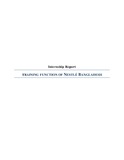| dc.contributor.advisor | Akhtar, Afsana | |
| dc.contributor.author | Sazid, Syed Mohammad Shihan | |
| dc.date.accessioned | 2012-03-01T03:42:36Z | |
| dc.date.available | 2012-03-01T03:42:36Z | |
| dc.date.copyright | 2012 | |
| dc.date.issued | 2012-01-08 | |
| dc.identifier.other | ID 07204036 | |
| dc.identifier.uri | http://hdl.handle.net/10361/1621 | |
| dc.description | This internship report is submitted in a partial fulfillment of the requirements for the degree of Bachelor of Business Administration,2012. | |
| dc.description | Cataloged from PDF version of Internship report. | |
| dc.description | Includes bibliographical references (page 46). | |
| dc.description.abstract | Nestle is world’s largest health, nutrition and wellness company. Although globally it is twice in size of its nearest FMCG (fast moving consumer goods) competitors, in Bangladesh its journey is relatively new. But recent times it has experienced an organic growth of 40% and this trend predicted to continue in the coming few years. Nestlé Bangladesh focus on continues excellence of their employees for their better performance in the work at Nestlé and for the betterment of their career. In this paper there is a complete discussion about the current training process and also the process of end result evaluation. Training need assessment, preparation, training, feedback and finally work on feedback these are the step to conduct any training. By following these processes they providing training on Functional Skills, Organizational Knowledge, Business Skill, and Leadership Skill. The company has particular standard that they need to maintain for each session conducted. However every time it becomes difficult to evaluate the outcome by using rating or scoring process from the trainings and also it is not possible to numerically express the improvement of knowledge, skill and behavior that are use deliver through trainings. As a result in this paper an assessment is shown from result evaluation perspective and process evaluation perspective. Kirkpatrick Model is used for assessing from the result evaluation perspective and Context, Input, Process, Product Model (CIPP Model) is used for process evaluation perspective. The existing process of Nestlé Bangladesh does to match point to point with these models but it is serving the purpose efficiently and cost effectively. However in the coming days current training function will require modification according to the business need, as a result these assessment may help them for further improvement. | en_US |
| dc.description.statementofresponsibility | Syed Mohammad Shihan Sazid | |
| dc.format.extent | 56 pages | |
| dc.language.iso | en | en_US |
| dc.publisher | BRAC University | en_US |
| dc.rights | BRAC University Internship reports are protected by copyright. They may be viewed from this source for any purpose, but reproduction or distribution in any format is prohibited without written permission. | |
| dc.subject | Business administration | |
| dc.title | Training function of Nestle Bangladesh | en_US |
| dc.type | Internship report | en_US |
| dc.contributor.department | BRAC Business School, BRAC University | |
| dc.description.degree | B. Business Administration | |

